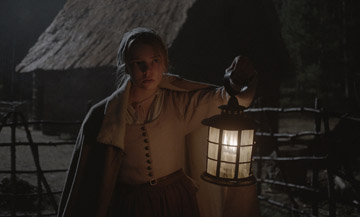Movie Review: The Witch
By Ben Gruchow
February 23, 2016
BoxOfficeProphets.com

There is some introduction, I suppose. The story is about a family ejected from their village in New England and cast out into the wilderness, owing to what appear to be extremist religious views and behavior. The nominal head of the family is the father, William (Ralph Ineson), but the real focus is almost entirely on Thomasin (Anya Taylor-Joy). She occupies the movie’s first shot; when the family is ordered to take their leave of the plantation, it’s her reaction we see, and the departure from the town is from her point of view, on the back of a family wagon that looks ready to fall apart at less than the slightest provocation. The family finds a seemingly innocuous and peaceful area of the wilderness to settle down, and they begin construction on a farm.
These moments allow us to reflect on our surroundings; The Witch is an evocation of time and place, and at this it is flawless. By this I mean that there is no hint of set dressing or costume design or special effects. The majority of the film takes place in an isolated clearing surrounded by forest, and what’s apparent is the setting’s manifestation as a state of mind even more so than as an oppressively physical location. There’s no way to tell how far from civilization we are, and this is crucial not only to the mood, but to the escalating progression of odd and ominous events that the family encounters.
The same animals appear in different places, seeming to watch the children. The family’s black goat seems to be having an effect on twins Mercy and Jonas (Ellie Granger and Lucas Dawson). Most alarming, Thomasin is playing peek-a-boo with infant Samuel one day, and he disappears before her eyes. There is some rustling in the brush at the edge of the woods some distance away, but nothing else. This sends the family into a deep depression, particularly the mother (Kate Dickie), who is shown to be as religious as William. The culprit is said to be a wolf, carrying the child off. We in the audience know better; we have already seen a hooded and cloaked figure carrying Samuel to its hideaway, and we’ve been witness to a disturbing act of violence and sacrifice.
What I’ve just described are events that happen quietly and with some deliberation, and The Witch is light on jump scares or horrific imagery. This is appropriate; the opening title crawl informs us that this is a folktale, and the closing credits tell us that much of the spare dialogue is transcribed from historical record. We reflect on how much a folktale is dependent on preserving its meaning despite being passed down and re-shaped and re-contextualized to fit the culture in which it’s told, and what The Witch has to pass on to us - about what fanaticism can be responsible for, and in a more literal sense the most horrifying type of consequence to pridefulness - is an enduring meaning.
A folktale of this type is also primarily concerned with the mythic, and the movie outlines its ominous developments in broad, bold strokes. We do not lack for smaller moments, such as a heartfelt scene between William and his son Caleb (Harvey Scrimshaw) after Samuel’s disappearance, where Caleb asks bluntly about the existence of hell, and whether or not his brother has gone there. But there are fewer and fewer scenes like these as we go on, and there is no humor to relieve us. The people involved in the world of this film have nothing to celebrate and little to be optimistic about. Instead, we continue to watch as crops fail to yield and more family members seem to fall under the influence of a malevolent outside force.
I use the word “seem” a lot in this review, and one of the more subtle cues as to the ultimate direction that The Witch is heading in has to do with who’s present in each setup, and who’s not present. Very rarely, after those opening few scenes, do we see everyone in the same place at the same time; without actually giving anything away, this does become germane to the final outcome. Scenes where characters are alone take on the most consequential action, and they’re also responsible for the movie’s moments of isolated, dreamlike horror (a beautifully-executed example of this - a single shot approaching a hut in the woods and revealing its occupant - is as short a jump from storybook illustration to cinema as you’re likely to get in a movie theater in 2016).
This is an expertly-rendered story. It’s not a stupendously literate or painstaking character study (except for what we bring to it as audience members, and that’s on us), and it doesn’t need to be; it captures the unique emotions of isolation and repentance and suspicion in a context that’s built for them. The final passages consist of disturbing implications regardless of how you interpret the material. It earns its mood.